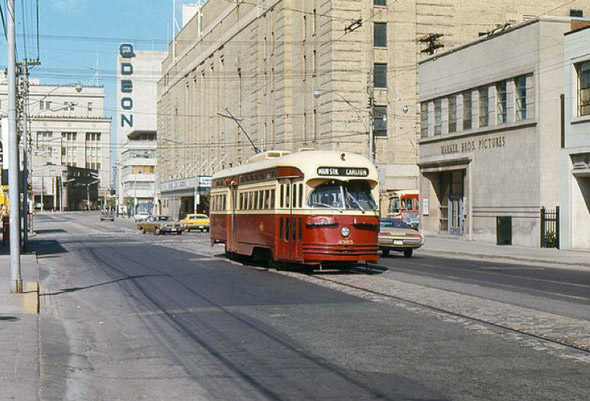- Messages
- 17,454
- Location
- New York City
I think the main impact trolley systems had on urban planning was the focus on getting rid of them. The systems that arose in the late 19th Century were integrated into a pre-existing infrastructure as best they could be, and by the second third of the 20th Century that infrastructure itself was going thru considerable upheaval, both due to new development in the 1920s and the improvement of existing roads and the construction of new ones to accomodate cars. Certainly the example of Robert Moses illustrates the dominant urban-planning view of public transport -- street rail systems were an impediment to the vision, not something to be preserved, and these views were further promoted and encouraged by those who had something to gain financially by abolishing the trolleys.
It's interesting to look at the "Futurama" exhibit at the 1939 New York World's Fair, a projection of the "America of 1960," based on the ideas of futurist Norman Bel Geddes strained heavily thru the filter of General Motors. This exhibit envisioned a national highway network -- which eventually came to pass as the Interstate Highway System -- and cities dominated by auto traffic, and no ground-level railways of any kind. The streets in the Bel Geddes/GM vision belonged exclusively to cars, with the roads to be rerouted and laid out in such a way that traffic jams couldn't exist. This was the sort of vision that motivated planners like Moses, who often suckled at the GM teat -- as witness his acceptance of a $25,000 cash bribe, er, contest award from the automaker in 1953 -- and who never missed a chance to promote the GM agenda.
I agree completely with this ⇧ - no counter argument at all. But I would add, Americans - to this day (with, maybe, the exception of the Millennials) - love their cars. To be sure, they might have been "taught" to love them by GM and their ilk, but it is what it is.
I'm a mass transit / city person who wishes that in the '50s we had invested in streetcars/ trollies / interurban / etc. and a national train system as well, but that was not what America seemed to want back then. We seemed to want and got a national highway system and the slow death of trains, etc.
That was the decade that determined the future - trains / trolleys or cars / highways. While I'll denounce Moses and what he did to NYC and the worse things he wanted to do that were, thankfully, stopped, he couldn't have succeeded without some meaningful part of the population behind him / his ideas.
Maybe today they wouldn't be, but at the time, many Americans wanted cars / highways to be the future. And, unfortunately, decisions made in the '50s and '60s put an infrastructure in place that is almost impossible to change. My guess, America would be more open to trains / streetcars / interurbans today, but not at the insane dollars that truly converting that old infrastructure would cost






